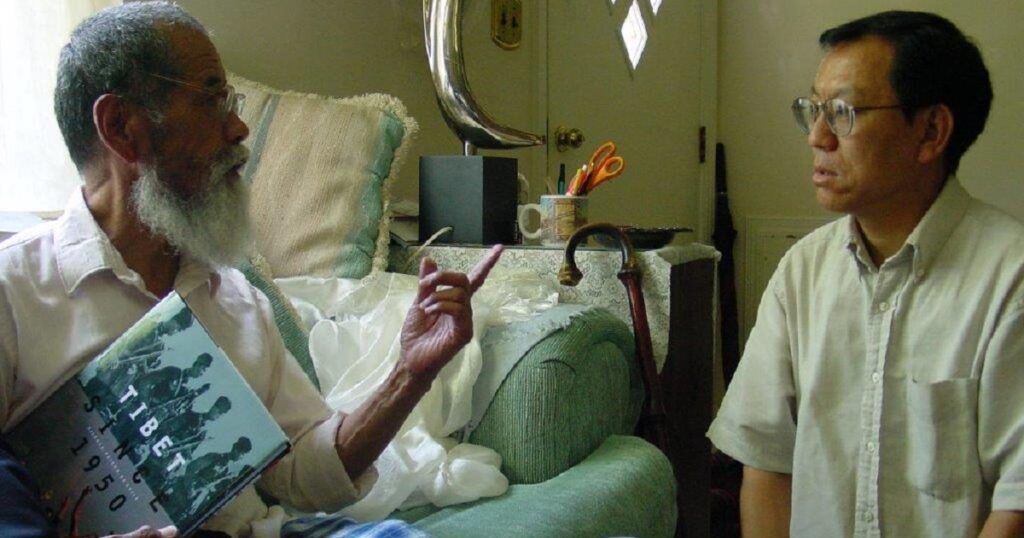Such occasions arose for us in the early 2000s when the Chinese authorities released four Tibetan political prisoners between 2002 and 2004, who were subsequently sent to the United States. Since the International Campaign for Tibet was then providing support to the Special Envoy of His Holiness the Dalai Lama in Washington, D.C. we were closely involved in arranging for the resettlement of the former political prisoners. Takna Jigme Sangpo was the second in the group, the others being (in order of their dispatch to the United States) ethnomusicologist Ngawang Choephel, Drapchi nuns Ngawang Sangdrol and Phuntsok Nyidron.
The process would be something like this: Special Envoy Lodi G.Gyari is informed by the State Department about the impending release of a Tibetan. ICT then steps in to work on the logistics; housing, medical treatment, long-term stay, etc. We would work with the individual to discuss future plans and how we could help realize them. Accordingly, from the four that were sent to the United States, Takna Jigme Sangpo and Phuntsok Nyidron opted to be resettled in Switzerland as it had also taken an active interest in their cases (we facilitated their interaction with the Swiss Embassy) while Ngawang Choephel and Ngawang Sangdrol (we assisted in their documentation) settled themselves in the United States.
Although in his seventies when he arrived in the United States, he was mentally very alert. One of the very first things he told us during our first meeting with him was how he noticed that we were all mistaken in calling him “Tanak” (which we were doing then) and that the correct form was “Takna” like it is in “Tiger’s nose”. Also, following his medical checkup at Georgetown hospital, he took it in his strides when the doctors kept him in an isolated room for a few days after they suspected him of having TB.
While John Kamm, American businessman and human rights campaigner, is to be rightly complimented for relentlessly taking up the cases of Takna Jigme Sangpo and the three other Tibetan prisoners who were released, his work was helped by strong support by the United States Congress and the Administration. In the case of Jigme Sangpo, Congressman Tom Lantos (since deceased) was among those who took a lead on his behalf.
Since then there have not been any more Tibetan political prisoners released to the United States by the Chinese authorities. In general, the four Tibetan political prisoners were released and sent to the United States not because the Chinese authorities felt that that was their right, but because they thought they would win the support of the United States, on this.
That was the period when President Jiang Zemin and his successor President Hu Jintao were desirous of improving relations with the United States to fulfil their own agenda for China. Similarly, the United States Congress and Administration were sending the right message to China. In a report on October 18, 2002, the Washington Post analyzed the circumstances leading to the release of prisoners by China saying:
“When President Bush last met with Chinese President Jiang Zemin, a senior State Department official passed a list of 13 jailed dissidents and other prisoners to a Chinese counterpart and delivered a message: If China wanted better relations with the United States, it should let these people go.
“The Chinese government responded in the following months by releasing two of the individuals on the list. They were Jigme Sangpo, a Tibetan teacher who was one of China’s longest-held political prisoners, and David Chow, a U.S. businessman jailed eight years ago on questionable fraud charges. Today, eight days before Bush and Jiang are scheduled to meet again, China released a third person on the list, a young Tibetan nun named Ngawang Sangdrol who was imprisoned in 1992 at the age of 15.”
So Takna Jigme Sangpo symbolized a few things. He symbolized the determination of the Tibetans in Tibet in standing up for their rights. The governmental support for his release symbolized the international community’s concern for the Tibetan people. His release and subsequent dispatch to the United States indicated the fact that if the Chinese Government is placed in a situation where it is in their interest to change their approach to issues relating to Tibet, they will do so.
Takna Jigme Sangpo passed away on October 17, 2020. This article was written for Swirling Red Dust, the story of Tibet’s longest-serving political prisoner, Blackneck Books in collaboration with ICT-Europe, 2017. Although China did not release any Tibetan political prisoners in a similar way in recent years, in a different circumstance, ICT had the opportunity to assist Dhondup Wangchen when he arrived in the United States in 2017.

